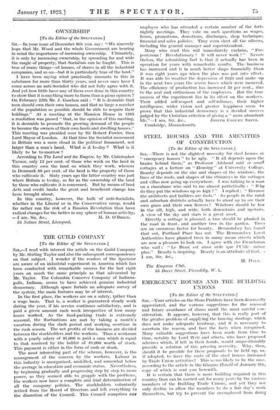THE GUILD COMPANY
[To the Editor of the SPECTATOR.] read with interest the article on the Guild Company by Mr. Stirling Taylor and also the subsequent correspondence on that subject. I wonder if the readers of the Spectator are aware of an industrial experiment in America which has been conducted with remarkable success for the last eight years on much the same principle as that advocated by Mr. Taylor. The Columbia Conserve Company of Indiana- polis, Indiana, seems to have achieved genuine industrial democracy. Although space forbids an adequate survey of the system, the main features may be of interest.
In the first place, the workers are on a salary, rather than a wage basis. That is, a worker is guaranteed steady work during the year, if his service continues satisfactory, and is paid a given amount each week irrespective of how many hours worked. As the food-packing trade is extremely seasonal, the fluctuations are met by taking a month's vacation during the slack period and working overtime in the rush season. The net profits of the business are divided between the stockholders and the workers. Thus a workman with a yearly salary of $1,000 is paid a sum which is equal to that received by the holder of $1,000 worth of stock. This payment is either in the form of cash or stock.
The most interesting part of the scheme, however, is the management of the concern by the workers. Labour in this industry is unorganized, unskilled, and somewhat below the average in education and economic status. Nevertheless, by beginning gradually and progressing step by step to more power, as they seemed able to grapple with the problems, the workers now have a complete and final determination of all the company policies. The stockholders voluntarily retired from the Board of Directors and left everything to the discretion- of the Council. This Council comprises any employee who has attended a certain number of the fort- nightly meetings. They vote on such questions as wages, hours, promotions, demotions, discharges, shop technique, financial and sales policies. They even elect all the officers, including the general manager and superintendent.
Many who read this will immediately exclaim, " Pre- posterous ! Revolutionary ! It will never work ! " Never- theless, the astonishing fact is that it actually has been in operation for years with remarkable results. The business has increased and is in much better shape financially than it was eight years ago when the plan was put into effect. It was able to weather the depression of 1920 and make up in the next two years the severe losses which were incurred. The efficiency of production has increased 50 per cent., due to the zeal and enthusiasm of the employees. But the true success of the experiment lies in its effect on the workers. Their added self-respect and self-reliance, their higher intelligence, wider vision and greater happiness seem to prove that this industrial democracy is a decided success judged by the Christian criterion of giving a more abundant










































 Previous page
Previous page